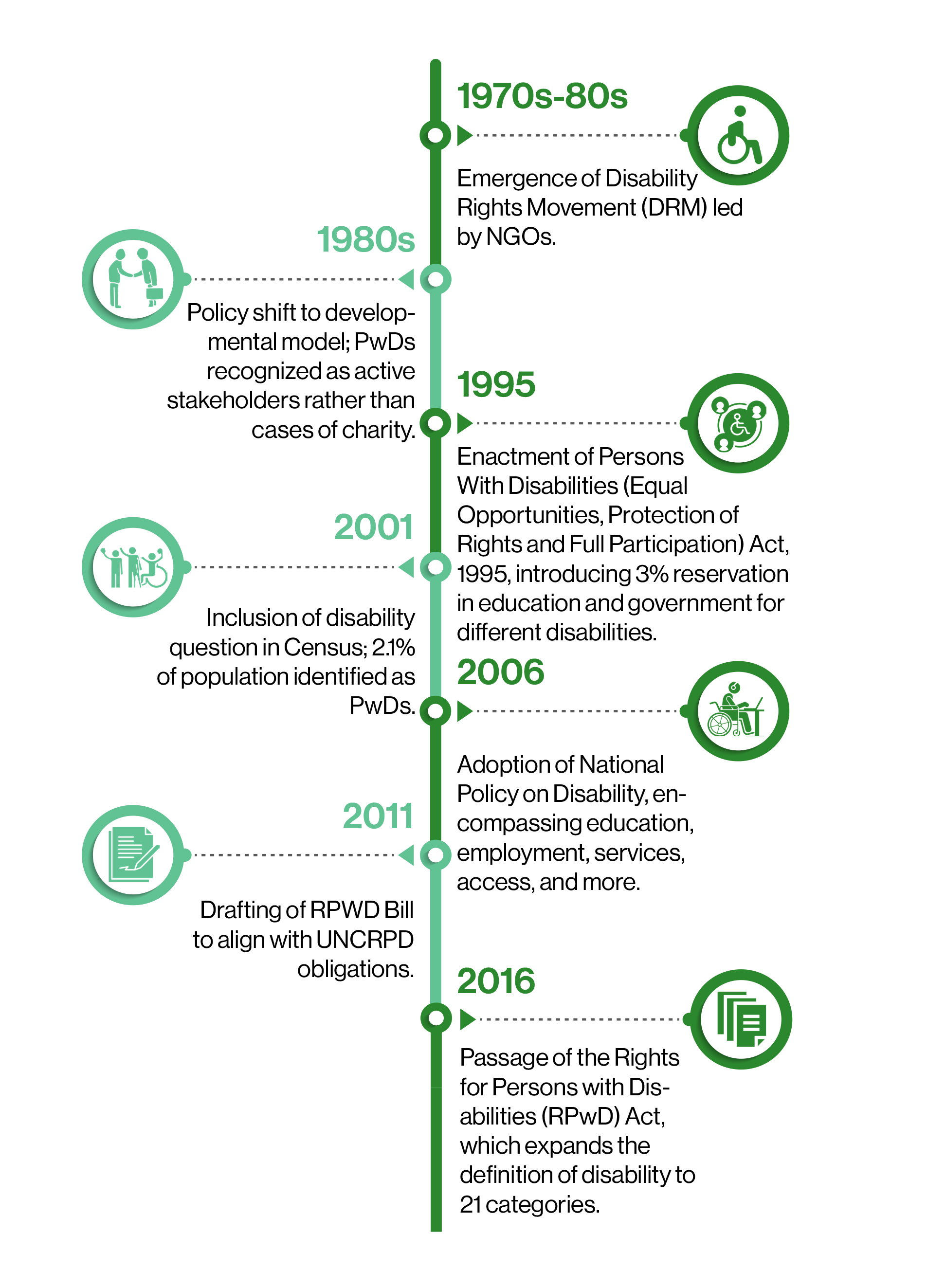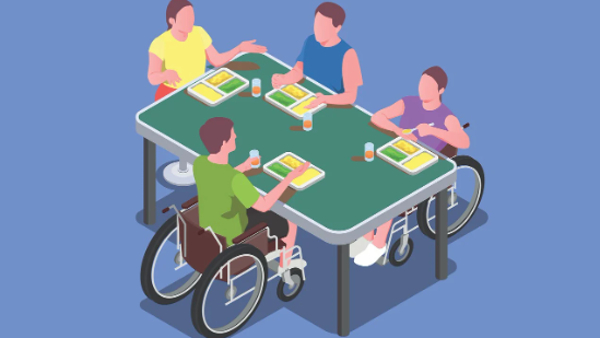Brief Introduction
Recently, the GDi team had the incredible opportunity to serve as the Knowledge Partner at the Zero Project India Conference and CII IBDN National Conference in New Delhi. This marked the debut of the globally renowned Zero Project's journey in India and provided a unique platform to comprehend the often overlooked systemic challenges experienced by Persons with Disabilities (PwDs). The GDi team played a pivotal role in organizing and managing the Conference and in preparing knowledge products for dissemination in the ecosystem (such as the Accessibility Playbook, a resource for any organization to make any event they organize as accessible and inclusive as possible, regardless of scale).
Key learnings from the sector
As part of the team that worked on the engagement, Zero Project India has served as a meaningful way to create impact at scale by fostering discussions and dialogue among diverse stakeholders, and getting in-depth knowledge of a field whose impacts on everyday life often tend to be ignored. There's substantial progress in the disability space in India, yet crucial challenges persist, as highlighted in the course of organizing the Conference and our interactions with experts in the sector:
- Education and Livelihood Challenges: The absence of adequate educational resources in childhood contributes to diminished employment prospects for Persons with Disabilities (PwDs). A decline of over 90% in higher secondary enrollment for children with disabilities from primary schools signifies a concerning 'leaky pipeline' in education, rooted in attitudinal barriers, lack of support, inaccessible schools, and insufficient tailored learning materials. Identification and certification of disabilities also pose significant challenges.
- Employment and Skill Mismatch: The low Labour Force Participation Rate for PwDs (23.8%) is linked to limited access to quality education, low literacy rates, a scarcity of vocational training programs, and negative workplace attitudes. This results in reduced job satisfaction and limited career advancement opportunities for PwDs.
- Inclusivity Efforts and Existing Challenges: India has made strides in promoting inclusivity and accessibility, with legislative changes and campaigns such as the Rights of Persons with Disabilities Act, 2016 (which introduced several schemes for empowerment of PwDs, such as the Accessible India Campaign and a one-of-its-kind plan for skill development of PwDs, and also increased the number of disabilities recognized in India from 7 to 21). However, challenges persist across government, private sector, and civil society in terms of coordination, fund utilization, and streamlining processes.


Breaking the cycle of poor livelihood outcomes, thus, requires cross-sectoral interventions fostering inclusivity and accessibility in education, skill development, employment, and technology. Collaboration across various sectors is vital to create an environment where individuals with disabilities can thrive and contribute meaningfully to society.
Key learnings from the Conference
In my journey with the Zero Project India Chapter, I've observed the immense potential for transformative change through global collaboration, especially when it comes to fostering inclusive employment. Through insightful panel discussion, keynote addresses and a state-of-the-art exhibition, the Conference also allowed me to gain valuable insights into the power that collaborative efforts for inclusivity hold and the positive impact that can be created if businesses and persons with disabilities joined hands, fostering an inclusive work environment and leveraging technologies like AI to make employment more accessible and supportive for everyone.
The Conference helped cement an understanding of the intersectional nature of disability in everyday life. For instance, for rural livelihoods, recognizing the intersectionality of disability involves eliminating income gaps based on disability, offering necessary support systems for those with higher needs, and creating job opportunities closer to rural areas.
The impact of collaborative efforts was also highlighted in the keynote address given by Shri Rajesh Aggarwal (Secretary, Department for Empowerment of Persons with Disabilities), who also emphasized on ground breaking initiatives introduced by the government for welfare of PwDs. The recently launched Bhashini portal, for instance, enables easy access of the Internet to PwDs. Products such as the Bhashadaan Platform for Sign Languages aim to crowdsource a comprehensive sign language database to help enrich AI models for effective text-to-speech translations. Not only is this the first of its kind initiative in India, but it will also go a long way towards creating technology based language models that are inclusive in all senses.
Another recent initiative of the government, the PM-DAKSH portal, is housed under the National Action Plan (NAP) for Skill Training. It serves as a comprehensive, one-stop digital platform for PwDs seeking skill training and employment opportunities and job listings from across India. It also furthers the government’s aim to create inclusive and accessible digital public goods in an increasingly interconnected world.
Technology, thus, is a field that holds the capacity to help PwDs break out of the vicious cycle of poor livelihood outcomes. Apart from government interventions, assistive technology is a field that can also provide much-needed support to PwDs. An aspect of the Conference that particularly stood out to me were the exhibitions put up by ~30 organizations working in developing assistive technology or livelihood support programs for PwDs. The list of technological products on display ranged from a mobile application to listen, translate and digitise content across 60 global languages (Kibo Mobile App by Trestle Labs), to India’s first on-demand Indian Sign Language interpretation service for the deaf (developed by SignAble Communications) to AI based smart vision wearable glasses for the visually Impaired (developed by SHG Technologies). The vast majority of these innovators also stressed that technology-backed assistive solutions should encompass the entire ecosystem, from research to the final delivery, to comprehensively meet the diverse needs of PwDs.
Creation of inclusive workspaces, development of livelihood support programs or building scalable models for assistive solutions, however, are all remiss without investment. investing in initiatives that create meaningful impact in the lives of PwDs requires essential support through grants, investments, and assistive technology. The investment landscape is shifting towards the next half billion, necessitating support for early-stage entrepreneurs and accurate market definition, focusing on measurable impacts beyond quantitative measures for impactful returns.
Conclusion
The responsibility for inclusion, thus, lies not just with the excluded but also with corporate environments that need to create and sustain job opportunities for PwDs. The significance of collaborative efforts, inclusive policies, and the evolution of the job market to empower PwDs, can not be understated. Moreover, there is an urgent need for continuous support, investments, and a change in societal perspectives to create a more accessible and equitable society in India, ensuring persons with disabilities have equal opportunities and are integrated at every level of community and industry.
